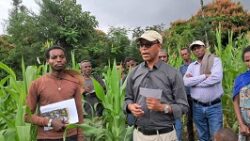By Mekonnen Teshome –
Recurrent drought is one of the overwhelming natural disasters in Ethiopia mostly occurred due to alterations in rainfall patterns. The country faces frequent crop failures thereby food insecurity because of these drought-induced impacts which have always increased significantly in magnitude and frequency over the last several decades.
Hence, technology development and research institute like the Ethiopian Bio & Emerging Technology Institute (BETin) are now shouldering the responsibility of tackling the challenges through an innovative agricultural research practices and technologies.
Drought tolerant varieties of maize
Well aware of the serious productivity challenges posed in dry land areas in Ethiopia, the Bio & Emerging Technology Institute (BETin) in collaboration with partners have carried out optimistic maize field trials to mitigate the challenges of drought on the crop’s productivity. This research and development efforts, according to the institute, has shown encouraging results and is bearing fruits.
BETin formerly called the Ethiopian Biotechnology Institute together with its collaborators, the Nigerian based International Institute of Tropical Agriculture (IITA) and its local partners Sekota Dry Land Agriculture Research Center, have seen a glimmer of hope towards the selection, trial and adaptation of drought tolerant Open Pollinated Varieties (OPV), in Lalibela, and Ziquala localities of the North Wollo Zone, Amhara Regional State, which are semi-arid and dry lands.
The OPV genotypes have been provided by Principal Scientist and Global Maize Program Leader of IITA, Dr. Abebe Menkir. The maize OPV lines have been developed through conventional breeding methods and showed superior performance in terms of drought tolerance and productivity in arid and semi-arid regions of West and Central Africa including Nigeria.
According to BETin, this effort of introducing the new varieties aims at boosting the production and productivity of maize and improving the livelihoods of the local farmers through trial, evaluation, and adaptation is of paramount importance to tackle household food insecurity in the region.
Recently delegates drawn from BETin and Sekota Dry Land Agriculture Research Center paid a visit to the field trial sites to evaluate the progress of the research activities and the team has confirmed that encouraging results have been obtained from the performance trials.
During the visit, it was indicated that the highly problem-solving and farmer – participatory project originally initiated by BETin Director General Dr. Kassahun Tesfaye seems to be promising.
Present at the field visit BETin Director General Dr. Kassahun Tesfaye and the Deputy Director General Dr. Hailu Dadi, outlined possible future directions based on the selection works undertaken by farmers and the results obtained from scientific analyses of the data collected by the Researchers.
Moreover, Dr. Kassahun Tesfaye said that coordinated efforts and further collaborative works could be done with similar research centers for instance with the Fedis Agricultural Research Center, Oromia Regional State, in the next harvest seasons and expand this to the country level securing the approval of the National Variety Release Committee (NVRC).
National Variety Release Committee (NVRC) Chair Prof. Firew Mekbib commended that the approaches followed by BETin and Sekota Dryland Agriculture Research Center are timely and his committee is confident that the effort made towards releasing and registering better performing maize genotypes through a fast-track variety evaluation options would be materialized as per NVRC policy.
Climate-Smart Varieties
Many studies indicated that Climate Change is continuing to have an adverse impact on agriculture including maize production. Therefore, adoption of climate change adaptation and mitigation strategies that increase agricultural productivity and building farmers’ resilience capacity has become a top policy priority in Ethiopia in particular and Sub-Saharan Africa in general.
Hence, the Sekota Dry Land Agriculture Research Center has sent vital information related to the local ecology and climate in order to facilitate the selection of appropriate species and crop variety that are suitable for the arid areas.
Based on the information, 20 maize varieties have been tested for climate suitability and drought-tolerance in Lalibala and Ziquala localities in just one year after the trial center received 10 OPV genotypes each. As to the local farmers and members of FRGs, the new research effort will increase maize productivity in Lasta and Ziquala areas.
Participatory – “Farmers Researcher Groups (FRGs)”
BETin’s trial, selection and adaptation of the maize is not only the responsibility of research scientists but it is also of farmers who are the end-users of the technology. The Institute has given the recognition that agricultural research should involve the farmers themselves, “Participatory Approach” has been developed to help the “Farmers Researcher Groups (FRGs)” in the identification and utilization of the most appropriate methodology, experimental procedures and technologies.
Farmers are involved in selecting the maize varieties by their own criteria as varieties selected in a user-oriented, problem-solving and locally adapted manner would ensure sustainability and in fast-tracking accessibility and immediate adoption of technologies. The farmers have already identified their own preferences with the new varieties.
At the occasion, Center Director of the Sekota Dry Land Agriculture Research Center, Dr. Adane and crop breeder at the Center Kendalem Yaregal, underscored that absence of maize varieties which are drought-tolerant and adapted to poor soil fertility have resulted in low production of the crop in the localities.
Apparently, everybody is looking forward to when the new varieties of maize are going to be introduced, it is expected that adoption of these drought tolerant varieties will make a substantial contribution to ensure food security among the rural communities and farmers inhabiting these areas.

